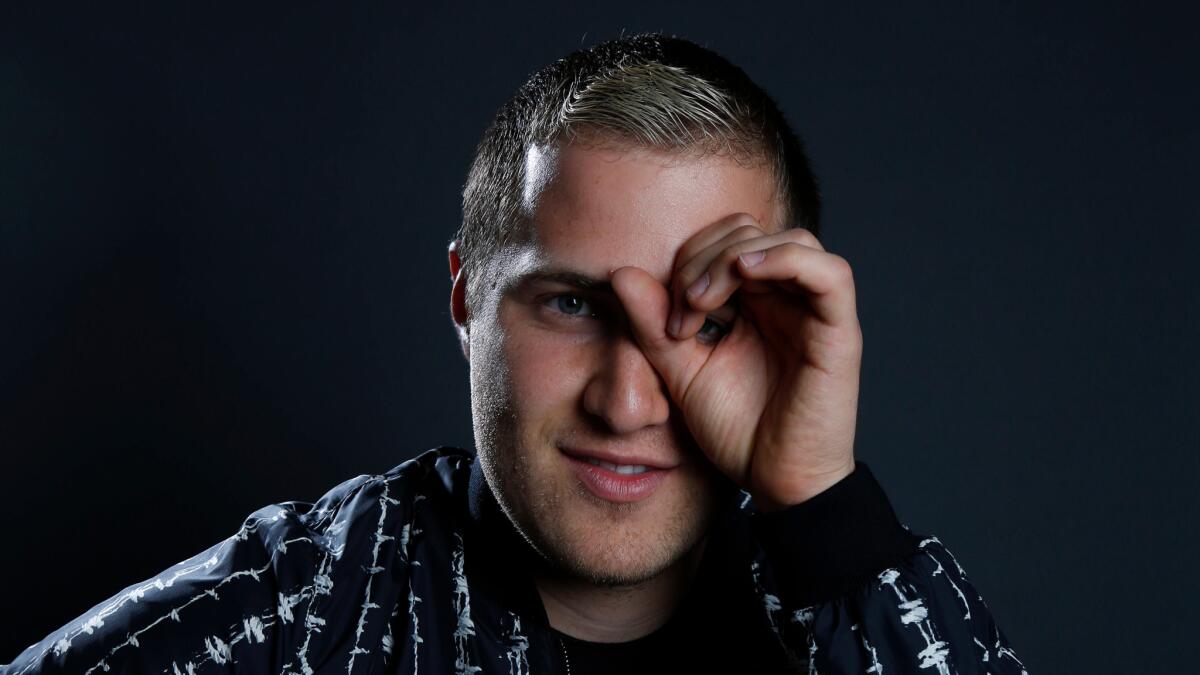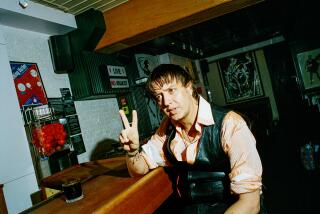Mike Posner on ‘I Took a Pill in Ibiza,’ his club jam that wasn’t meant to be

Watch Mike Posner, known for a sleek dance remix of his song “I Took a Pill in Ibiza,” try something a bit more rootsy.
The inside joke of Mike Posner’s “I Took a Pill in Ibiza” was easy to grasp when the singer released the song last year on an acoustic EP titled “The Truth.”
Ibiza, of course, is the island off the coast of Spain known for its ecstatic dance clubs — and here was a guy using the place as the setting for a rather morose little ditty hand-played on folky guitar.
But then something unexpected happened.
The Norwegian duo Seeb remixed “I Took a Pill in Ibiza” — in which Posner describes the disillusioning experience of celebrity — with the type of shimmering tropical-house beat that’s propelled tunes like Kygo’s “Firestone” and Justin Bieber’s “What Do You Mean?”
The remix became a huge hit, racking up more than a billion plays on YouTube and Spotify and reaching No. 4 on Billboard’s Hot 100. It also helped land Posner a gig opening for Nick Jonas and Demi Lovato on their summer arena tour, which wraps Saturday night at the Forum in Inglewood.
Now “Ibiza,” a pop smash about trying not to have pop smashes, delivers a different laugh.
“There’s a beautiful irony to it,” Posner, 28, acknowledged on a recent afternoon. “I made this sad song that people are getting joy out of. As an artist, you can’t really ask for anything more.”
It’s actually an irony Posner knows well. A Detroit native who started making music at age 8, he broke out in 2010 with “Cooler Than Me,” a bouncy, synth-based number about his attempts to attract a woman who can’t be bothered to remember his name. The song sold more than 3 million copies and brought Posner the material comforts he lays out precisely in “Ibiza”:
I’m living out in L.A.
I drive a sports car just to prove
I’m a real big baller ’cause I made a million dollars
And I spend it on girls and shoes
Subsequent singles performed well enough to keep Posner on the hamster wheel of fame — but not well enough that he felt he could step off it.
“I was very attached to the approval,” he said as he sat in his manager’s Hollywood office, where a plaque commemorating platinum sales of “Ibiza” leaned against a wall. “I had attained some measure of worldly success, and I didn’t want to lose it. I was like, ‘Let me just repeat what I’m doing so I can keep having more of that.’”
Met with diminishing results, he eventually burned out on the process, even as songs he’d helped write for other artists — including Bieber’s “Boyfriend” and “Sugar” by Maroon 5 — vaulted up the charts.

Yet Posner was still attached to the idea of performing his own music. So he said he did what few others in his position likely would: He bought a van with a bed in the back and drove to the mountains of Utah, bringing little more than a guitar with him.
“I just wanted to leave — like, literally leave — all those things: the house, the sports cars, the dumb shoe collection. And the inordinate amount of attention from the opposite sex. I wanted to see if I could be happy without that,” he said with a smile. “And I could!”
In the songs he wrote during and after this period — “I Took a Pill in Ibiza,” but also “Be As You Are” and “One Hell of a Song” — Posner looks back on his varied experiences with a sharp eye that can suggest a millennial Randy Newman.
And this time, he said, putting those stories across was more important to him than devising a catchy pop production. The guiding philosophy for “At Night, Alone,” the stripped-down album he released in May? “Let’s do as little to these songs as possible without making them boring,” he recalled.
“Even in the mixing phase, I told our mixer, ‘I want the vocals three decibels louder than you do on every other album.’ I want everyone to hear the words.”
Indeed, Posner’s lyrics are what grabbed Simen Eriksrud of Seeb, who compared the singer’s original take on “Ibiza” to a movie.
“Immediately you say, ‘What’s this song about?’” Eriksrud said. “You want to know more.” And though Seeb’s version dramatically speeds up the song — and changes the chords from major to minor to get what Eriksrud called “that happy-sad Scandinavian feeling” — the remixer insisted his goal was to keep the focus on Posner’s vocal.
The singer himself is happy with the liberties Seeb took in remaking his acoustic lament as a thumping club banger. The way he sees it, the left-field hit only positions him to take more chances in the future — and to be less reliant on whatever formula anyone’s looking to him to fulfill.
“I want my brand to be that I have no brand,” he said. Then he explained how every time he’s in a taxi or an Uber, the driver will ask him what he does. He’ll say he’s a musician, which will lead the driver to ask what kind of music he plays.
“And I always say that I change with every album,” Posner said. “Then the guy will say, ‘Well, what was your last one?’
“‘Kind of a folky singer-songwriter thing. But my next one won’t be.’”
Twitter: @mikaelwood
More to Read
The biggest entertainment stories
Get our big stories about Hollywood, film, television, music, arts, culture and more right in your inbox as soon as they publish.
You may occasionally receive promotional content from the Los Angeles Times.











